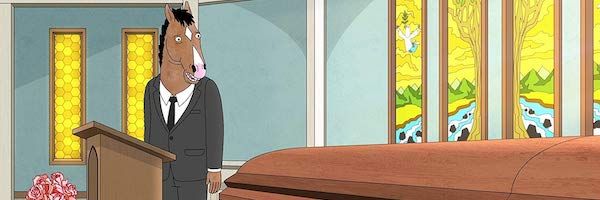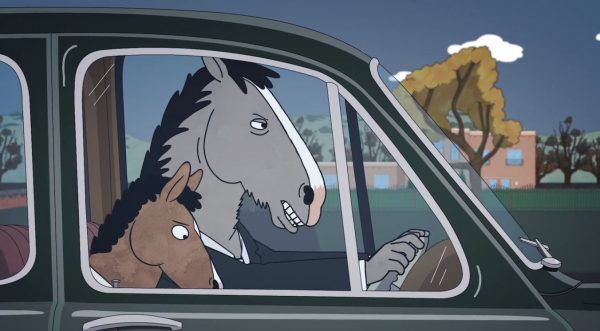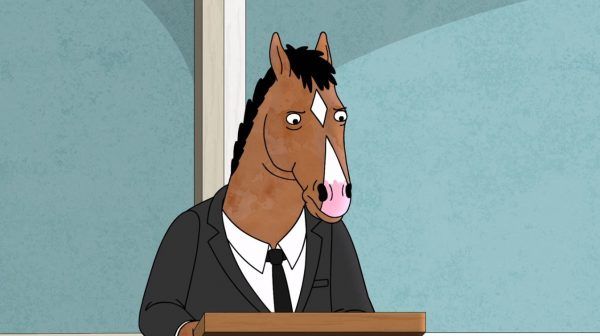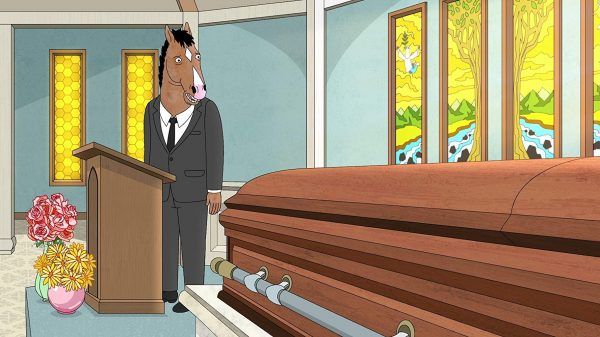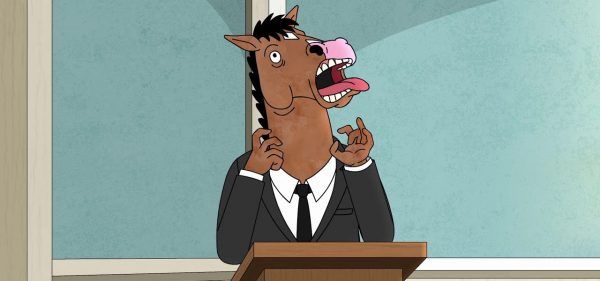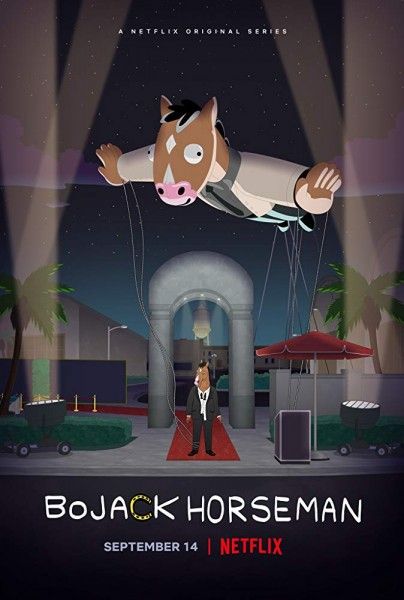Last year, Will Arnett delivered an award-winning performance as the title character of BoJack Horseman. Arnett normally takes on the lion's share of the dialogue in each episode of the animated Netflix series about an anthropomorphic horse-man struggling to stay relevant in Hollywoo, but the episode "Free Churro" was something unique. The half-hour was split between a pair of monologues from Arnett: a relatively short opening flashback speech from BoJack's late father Butterscotch (also voiced by Arnett) and a much longer monologue delivered by BoJack as a eulogy for his mother, Beatrice. That performance was enough to land Arnett an Annie Award, but the episode itself is now nominated for an Emmy, a first for the creative team.
I was recently able to chat with BoJack Horseman creator and showrunner--and writer of the Emmy-nominated episode--Raphael Bob-Waksberg, the show's supervising director Michael Hollingsworth, and this episode's director Amy Winfrey about all things BoJack. Much of our conversation revolved around the Emmy-nominated episode "Free Churro", Arnett's performance in it, and the particular problems that arise in trying to animate what's essentially a 25-minute one-shot. It's obvious from the team's casual, back-and-forth sort of improv that there's a lot of creative talent behind the scenes of BoJack, and as the show is about to enter its sixth season, it's high time they were recognized for their incredible work.
Highlights from the interview follow below, but you can listen to our full audio to better appreciate the banter of the BoJack team here:
When did the idea of having what's essentially an episode-long monologue first come up and who was the first person who suggested it?
Raphael Bob-Waksberg: Well I'm the only writer in this interview, so I'll take full credit. But it probably came out of the writers' room. Every season we work on the show, one thing we talk about early on when were we're breaking the season, figuring out the season, is what kind of episodes do we want to do this year. Are there any different kinds of things that we haven't done before? And I really enjoy a challenge or something that pushes the form of what we do or makes us think about the story in a new way.
And so the idea of doing an episode that was one long monologue was really interesting to me. And so that kind of came first, the form of it, the idea that we were going to do an episode that was just BoJack talking for 20-odd minutes. And then from there, we talked about... "Okay, well what are stories that would justify that format, why would he be talking for a long time, and what could we do to make the episode feel special that it feels like, okay, you're not just watching BoJack, you know, on the phone ranting at a customer service representative." Although we've also done an episode about that. What would make it feel like, "Oh yeah. This merits the time we're giving it." And his relationship with his mother is something that was very fraught, particularly the previous season, Season Four. And so it felt like that would justify doing an episode like that.
Mike Hollingsworth: Yeah, I remember Raphael had been talking about that for a few seasons. When he was initially talking about it, you kept saying you wanted to do a whole episode as a monologue in one solid shot cut and what would that be like. And I just kept thinking of the storyboards and the overseas studios... I'm sure you have a lot of listeners who are actual animators. And to have a 25-minute file, like one one long scene file ...
Amy Winfrey: I've definitely encountered problems with a three-minute file and all the animators shooting dagger looks at me when I walked by when they're fixing that up on the backend. So yeah.
Bob-Waksberg: That would have been maybe too, too much.
Hollingsworth: I remember when I was talking to Raphael when he was initially wanting to do one in just one long cut. All I can keep thinking of is like you'd have to keep returning to a home base, a home pose so ... Like I said, I love the challenge. I mean, one thing that we've really been praised for on the show is some of our very lush animation sequences and our background gags and side characters as well as the the rat-a-tat dialogue. So to limit ourselves and take away all of those tools felt like a fun challenge for both of us on the writing side and on the animation side. And we're one of the few shows that has rat-a-tat dialogue with actual rats.
Bob-Waksberg: Actual rats. And they're tatting each other.
Since we're talking about the animation side of things, because of the complications, the difficulties that this extended monologue kind of poses, did you ever think about doing more flashback sequences with a narration over it?
Winfrey: Yeah. When we first started looking at the script, we were a little concerned, "Can we pull this off?" But then we went to the table read and heard Will Arnett actually do the script and it seems so compelling that at that moment I thought like, "Let's just go for this. Let's not even see the organist," because that was a discussion as well. "Do we want to see the one other character that's in the room?" But it seemed like a fun challenge to avoid that.
Bob-Waksberg: Yeah, I remember at our meeting, at the beginning, I offered, "If you think it's going to get boring, you can maybe show some of these flashbacks that he's describing," and you really said, "I'd like to try to not. I think we can not do it." And I think the challenge then was making his face interesting the whole way through. And I was really excited when I found out Amy was directing this episode because she'd done episodes before that have been very character focused. You did the BoJack and Princess Carolyn at the restaurant episode, right?
Winfrey: Yeah.
Bob-Waksberg: And I remember there were moments in that that it's just the two of them talking in the restaurant where really, you want to just look at their faces and these subtle micro expressions, these subtle changes. And so this felt like a good opportunity to have an episode full of that and really just be about how much can we convey visually with this animated character making different faces.
How much of Arnett's performance was directly from your script and how much of it was him playing around in the recording booth a little bit, or back and forth collaboration?
Bob-Waksberg: Very little. We do a little bit of improv on the show, but not much. The episodes, structurally, it's scripted pretty tightly and he has a lot of leeway in his performance of when to pause and how to emphasize certain things. But it was mostly as scripted. And we really didn't do that many takes. I mean this is such a behemoth of an episode to record in one sitting. Usually we'll have an actor and there'll be, you know, half of like three scenes and we'll get it done in like 20 minutes. I mean, Will usually has more than our average actor because he's a big part of every episode. But this was just... We knew if we got like five to seven takes, every paragraph would go all day.
So I really just kind of let him go and he just did it. I don't want to say cold. I think he worked on it a little on his own. But, similar to the table read, he kind of read through it and he would go for like a couple pages. And then I'd say, "Okay, you want to go back and maybe try a different version of some of that?" And he'd go, "Oh yeah, this part I didn't really nail. I'll do that again," but he took very little direction. It really is his interpretation of the script, and I think he really felt it and connected with it. You know, having played the character for this long and this many years and understanding that relationship that he has with his mother and also with himself and the things he talked about. And so I really just kind of let him be and, and I don't think I gave much direction at all.
Hollingsworth: It's a real tour de force performance. He won an Annie Award for it, for his performance. And this is a guy who's done a ton of voice-over. He's Batman and all these other memorable characters and this is his performance that he won his first Annie Award for, for voice-over.
Did he have to come back to do any ADR? Was there anything you guys wanted to kind of punch up or work on after the fact?
Bob-Waksberg: No, I don't think so. I think what you're hearing is from that first day.
Hollingsworth: There was one instance this season--I don't think it's a spoiler. It's the season we're working on now--I wanted to pitch a particular joke that Alison Brie would deliver a line with her mouth full cause I just thought it would be because they were eating and then she's like caught off guard. I thought it'd be funny if she answered with a mouthful of food. And so I went to Raphael like, "Can you please bring Alison Brie back in so she can pretend she has a mouthful of food to record this line?"
Bob-Waksberg: Right. And that's the kind of thing that we did because she was coming in anyway to record another episode. But if it was like a guest actress or something, who we only managed to get that one time, yeah, I'm not going to call like Anjelica Huston's agents to get her to come back to say the line again with food in her mouth.
Was this script an all hands on deck kind of situation?
Bob-Waksberg: Yeah. I would say it's every script is all hands on deck as far as the writers are concerned. We break every episode in in the room together. We talk about the story. We talk about the different beats of the story. In this case we actually hunted down an old episode of Maude, which we referenced in the episode where she's just talking to her therapist for the whole half hour, and that was really instructive to talk about, to look at like, "Oh how did they structure this monologue?" And we kind of saw like, "Oh, like a normal episode of Maude, there is an A story and a B story and a C story here. It just, she's telling all the stories. And so she'll talk about this for a little bit and then she'll kind of get distracted and wander over this area of the room and talk about that."
And that was really helpful in thinking of the structure of the episode. "Okay. We're going to have this A story here, which is BoJack's mother before she died, told BoJack 'ICU.' And that's going to be his home base and he's going to keep coming back to that." But meanwhile you can talk about other stuff. You can talk about his father's death, and he's gonna talk about his relationship with show business. And there's other things we're kind of sprinkling in, but it's helpful to kind of know we had some recurring themes or stories that on a regular episode would be their own scenes or sequences. But in this, it was just conversational. So we talked, we kind of broke it out like a, a normal episode of the show. And then I went off and wrote it.
Winfrey: When I was going to board it, I was aware of the sort of change and these sort of like, like Raphael was saying, how they kind of shifted focus and to these different stories and I tried to change the angle at that time just to kind of also give it a formal break, to keep you kind of engaged. So we would turn to like an angle that has Beatrice's casket in it just to weight that heavily towards Beatrice and that sort of thing just to reflect what you'd written.
Arnett's performance keeps you focused on him, but the way the animation, the angle of the camera kind of changes, that keeps you drawn in and unable to look away for, better or worse.
This episode feels like it kind of uncorked a bottle of a lifetime of pain that BoJack had been holding onto, but at the same time, it feels like it reveals BoJack when he's at his worst. Was there any difficulty in finding the balance in the script?
Bob-Waksberg: Yeah, I think it was very organic. I mean we don't put a lot of thought necessarily into... occasionally we do like, "Is BoJack becoming too much of a jerk ass here versus are we feeling bad for him?" But I did not so much in this episode. It's interesting to hear you describe it that way because I have is tremendous amount of empathy for him in this episode. And I think the things he's saying are, yes, I guess in the context of a person speaking at his mother's funeral, are perhaps inappropriate. But I think in the context of what our audience understands about his relationship with his mother and all he's done to get to this place. It's not a concern I had for this episode that we would lose the audience or they would hate him for what he's saying or what he's doing here. They've gone along with him this far, he's done much worse things than speak ill of his dead mother.
How much of BoJack's experiences are pulled directly from the writers and how much of it is you guys kind of theorizing a worst case scenario at times?
Hollingsworth: Well, I have to say that is a Raphael question, but I will just interject. Raphael has written and supervised the writing of some of the darkest shit that has ever been done in animation, but he also is the voice of Charley Witherspoon, this goofy frog. And that is basically him.
Bob-Waksberg: What do you mean that's basically me? How is that basically me?
Winfrey: Oh, I saw you fall of the yoga ball once.
Bob-Waksberg: That's true. Charley's penchant for physical and unintentional physical comedy is very much very autobiographical. I just did a Reddit AMA and someone asked me "Which characters I most relate to?," and I said, "A little bit BoJack. A little bit Diane. But mostly Charley Witherspoon because, like him, I also believe that being a boss is hard. And I also don't like getting yelled at and that's just something that people need to understand about me."
Those lines are very autobiographical. And when we were doing, whatever episode those are in, we're doing the cut of it and it was three minutes over and the editor was saying, "You know, we can cut this line about how Charley doesn't like getting yelled at," and I was like, "No! That's the heart and soul of the show!"
Hollingsworth: Yeah, the whole series.
Bob-Waksberg: The whole series. It's very important our audience connects to this moment. So I think this will really speak to a lot of people who also don't like getting yelled at. But to answer your question, I think I'd say very little of it is plot-wise autobiographical to me and the writers, but maybe some parts of it are emotionally autobiographical or we can extrapolate out of how we feel about certain things or situations or relationships and kind of build from there.
You know it is very much like this logic machine that we've built up of like, "Okay, we have this character now and we've seen how this character reacts to stuff. So therefore if we put this character in this situation thing, bing bong, boom, boom, boom, you know, you follow the ping pong ball as it bounces around."
Hollingsworth: I would say this show too is like more like autobiography biographical of society today. There's not a lot of shows, not a lot of cartoons where...you know BoJack is reacting to the Me Too era. He's reacting to gun violence. He's reacting to a lot of the things that are happening in our society.
Bob-Waksberg: Are you implying this was the first satirical cartoon show?
Hollingsworth: No. It's reacting in somewhat real time.
Bob-Waksberg: Well, Amy has worked on South Park, so I don't know if she'd agree with that.
Winfrey: We could react to things overnight.
Bob-Waksberg: Well, I don't know if we can beat that.
Hollingsworth: There was also Mary Worth.
Bob-Waksberg: Yes. It was very topical. Like other shows before us, we also do this thing.
Winfrey: But certainly there are a lot of moments that... the script arrived to me like fully formed, but I would relate to things that are in that script and it would help me inform the acting and what's going on in that and that was a, that was a good part of BoJack.
So you're up for an Emmy for this particular episode, but you guys already won an Annie award, a Critic's Choice award this year. What would an Emmy win actually mean to you and the creative team, since you've been nominated before, but this could be your first win. So what would that mean to you guys?
Bob-Waksberg: We've actually never been nominated as a show for an Emmy. Kristen Schaal was nominated for her voice work, and that's our sole Emmy nomination prior to this. So it's very exciting to be nominated. What does it mean? That it's always nicer to be nominated than not nominated. And it's always nicer to win than to not win. My general feeling about award shows that I've been to in the past was always that when you win, it's a great time. What a joy. You're celebrating there. And when you lose, the whole thing feels very stupid and why does anyone care about any of this. This is boring. I want to go home. And we've lost many things many times, I'm well-practiced in that. But it's exciting. I think it's good. Right?
Hollingsworth: Raphael, will you rent a tux?
Bob-Waksberg: I probably will rent a tux. Yeah. Which I usually don't.
Hollingsworth: At the last Critic's Choice Awards, which we've won three times. Raphael came late in his pajamas.
Bob-Waksberg: Well, we didn't win the previous year, so I thought it was... I thought our streak had ended. So we'd won twice in a row, I think. And then we lost. And so I was like, "All right, well it's over for us. Who cares? This is going to be boring." But then we won. But what a great show. Also, at the Critics Choice, you don't give a speech if you win for best animated show. So it didn't matter what I wore. At the Creative Arts Emmy's, where we're nominated, I think I will give a speech if we win, right? It will just not be televised.
Hollingsworth: Yeah, I think it's televised on FXX.
Bob-Waksberg: Is it televised? Oh great. I can tell my grandmother to tune in. Yeah. And if we lose, worst case, don't bother grandma.
In this episode, BoJack says during his eulogy, and I'm paraphrasing, "You never get a happy ending because there's always more show ... at least until there isn't." So I have to ask, is there an endgame in plan for BoJack Horseman, whether it's a happy one or not or are you just to kind of ride this as long as you can?
Bob-Waksberg: Yeah, I think you'll have to keep watching. I think life doesn't necessarily have an endgame. I mean, it's always been my vision of this show that we would keep working on it as long as it was interesting or as long as we felt like we had stories to tell and we're not necessarily driving towards one specific end point. This isn't like a Breaking Bad where it is like the rise and fall of a single guy or this is the specific arc we've been telling all along. I think the show exists like life exists and sometimes things might stop abruptly or sometimes things might slowly fade out. And I think it kind of depends where we're at when the show ends, where we'll leave the characters and then you'll have to keep watching to find out when that is.
BoJack Horseman Season 6 returns this Fall (presumably) on Netflix. The 71st Emmy Awards will air on Sunday, September 22nd.

